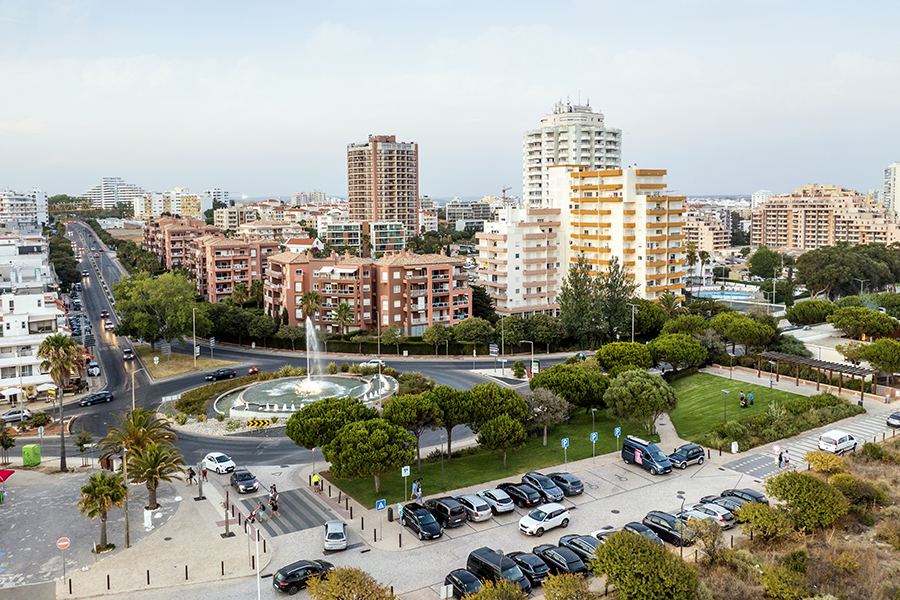 |
 |
One of these things is not like the othersIf you’ve traveled to other countries, you may have noticed that they often do things differently than we do here in the States. I’m not saying it’s good or bad, just different. Steve Martin noticed that phenomenon a few years ago:
This, I’m sorry to report, is true about Portugal, as well. In fact, it’s almost as if they’re teasing you about it. If, for instance, you have already put yourself out to learn another language, as Linda did several years ago, you might recognize some of the words. Many words in the Portuguese language seem deceptively similar to Spanish. But that’s not the way they’re pronounced. Portuguese sounds like a mixture of Spanish, Italian, French, and even Russian. Anyway, Steve Martin’s standup comedy aside, there were some noticeable differences about life in Portugal. Some things are almost not worth mentioning because they’re so unimportant. For instance, in Portugal, their toilet paper is perforated in rectangles instead of squares. See? Not really worth mentioning, except that it adds to my word count, so there it is. Other things, though, are kind of major. I’ll get to one major thing in a little while. But as a writer, I know not to just blurt it out. I’m going to build up to it. Starting with this kind of noteworthy thing: Top sheets don’t seem to be a thing over there. I noticed this a few years ago when I traveled to Scotland and Amsterdam. Bedding consisted of a bottom sheet and a duvet, basically a comforter enclosed in a buttoned cover. That was all. The same was true in Portugal. This might not sound like a noteworthy thing, but try getting comfortable under a quilt if the room is warm. We made a habit of turning thermostats down at bedtime, but they never reacted quickly enough for me to be okay with having a comforter over me. A couple of times, the places we stayed at had extra blankets, and they helped as starter covers. Eventually, as the room got cooler, then we could shed the blanket and make use of the duvet. Speaking as someone who lives in a place where the weather can consist of multiple seasons in one day, I know how to layer clothing. We do that on our bed, too. A top sheet, a couple of blankets and a bedspread or comforter. Again, I’m not saying either way is better, just different. (But I definitely have an opinion about which is better!) Next thing: In Portugal, the streets are narrow, especially in the older central areas of the cities we visited. We didn’t see a lot of big trucks or bloated, gas-guzzling SUVs. There were some, but gas – or petrol – costs roughly seven to eight dollars a gallon, so most can’t afford to waste gas like we do in the States with our vehicular overcompensation. And speaking of the streets, those cobblestone streets are quaint and charming. And artistic. Yeah, it was not unusual to see designs in the two-toned cobblestones, like giant mosaics. Sometimes, it was just abstract, wavy designs or stripes. Other times, it was truly impressive. One intersection in old Lagos featured an image of a giant octopus made of cobblestones.
While we’re still on the subject of the streets, do you ever use Google Maps to help you get where you’re going? A friend recently posted on Facebook how she wishes Google Maps wouldn’t talk so much. I responded that she should try it in Portugal where they name so many of their streets after people, using their entire name. For example, in Denver, Google Maps might give this direction:
In Lagos, Portugal, you might hear something like this:
That’s a lot to keep track of, especially when you really only need to know ‘left’ or ‘right’ and when. I was the navigator, so I started covering the speaker on my phone immediately after the turn direction was given. It’s enough to make you want to take a break with some refreshments. Which I think I'll do now. I'll continue this next week. I wrote a couple of weeks ago about the coffee in Portugal, but it definitely belongs in this list, as well. Portuguese coffee is not like American coffee, in a number of ways. First of all, the amount. You know how you sit down in a restaurant in the States for breakfast, and Flo comes around every now and then with a coffee pot in hand to top off your mug? That doesn’t happen in Portugal. You purchase a coffee, and you’re served one coffee. If you want more, you have to buy another cup. Francisca doesn’t come around with a pot of café Americano to top off your little cup. The coffee itself is excellent, though. It’s thick and rich, strong without being bitter. And it’s inexpensive enough that even if you want more, it’s not going to break the bank. Don’t get me wrong, I like coffee, even American coffee. Some more than others, of course. Admittedly, though, even the best American coffee is simply dark flavored water, with certain inherent medicinal qualities, but water nonetheless. But in Portugal, the coffee has a lot more texture. It’s not just wake-up juice. It’s something to be savored, to hold in your mouth for a bit, to feel, not just swallow. Portuguese coffee is sensual. I better move on before this post gets slapped with an “R” rating. In Portugal, I noticed that it was pretty rare to see a simple “trash can” in a public place. They may exist, but I don’t recall seeing one. Rather, what I saw were multiple, side-by-side receptacles for glass, plastic, paper and garbage. Recycling is something the country does as a matter of course. Surprisingly, according to a report by Reuters, Portugal recycles only about 28% of its urban waste, which is well below the European average of 46%. Still, I’m not sure where America sits on that report. But I know it’s pretty rare for me to see separate receptacles here in the States. Usually, it’s just a single trash can for everything. As I’ve written about before, one of the main concerns I have about growing old in the States is the cost of medical care. Since I, thankfully, didn’t have a need to make use of the medical facilities in Portugal, I can’t comment on them first-hand, though I suspect that would be up there on the list of major differences. But the thing that I determined was the major difference was, I admit, a little surprising to me. When I left and came back to the States, I didn’t expect to miss the roundabouts of Portugal.
Portimão, Portugal Admittedly, they seemed at first to be a little overdone. With the exception of the old central areas of the cities, almost every major intersection was a roundabout, or a traffic circle as they are so unimaginatively called in the States. Even entrances to highways were from roundabouts. Since we’ve been back, I’ve begun to wax nostalgic about them. Sitting at a red light, idling for two minutes at a time (or more) whether there’s any traffic or not can do that. In Portugal, even at busy intersections, the traffic pretty much kept moving. That’s not to say that every intersection was a roundabout. There were some that had traffic lights, but even those lasted only a few seconds. All in all, though, if I were making a list of pros and cons to determine which one I preferred, Portugal would definitely win out. According to numerous corporate motivational posters, “The most dangerous phrase in business is ‘We’ve always done it this way.’” I think that may be the trap that America as a country has settled into, as well. We’ve done things this way for so long that we can’t see the benefit of changing. Or maybe it’s just that change is difficult. And expensive. But that little country over there across the pond sure does a lot of things better than we do. I’d still like a refill of my coffee, though. |

